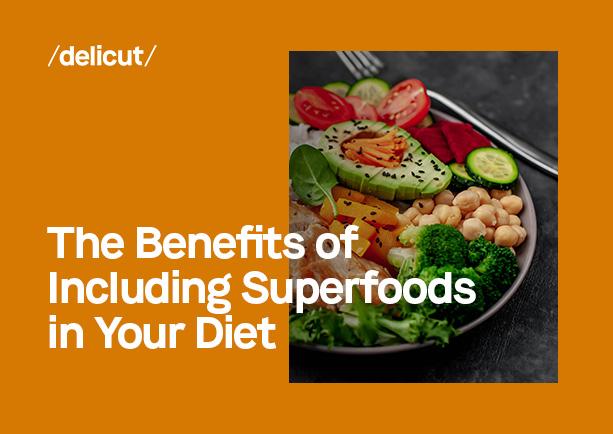The Benefits of Including Superfoods in Your Diet

While no one food can provide all the necessary nutrients, it is evident that certain foods are undeniably healthier than others. Opting for a leafy salad over a plate of fries, choosing a salmon filet over a loaded cheeseburger, or indulging in a yogurt parfait instead of a hot fudge sundae are all wiser choices for your well-being.
Moreover, even within the realm of healthy foods, some stand out. Registered dietitian Beth Czerwony, RD, introduces the concept of "superfoods" - a class of exceptionally nutritious and health-boosting foods that offer remarkable benefits for your body.
What is Diet Food?
Diet food is a category of foods specifically chosen and prepared to support weight management, promote health, or cater to specific dietary needs. These foods are often low in calories, fat, sugar, and salt while rich in essential nutrients, vitamins, and minerals. Diet food can include various options, such as whole grains, lean proteins, fruits, vegetables, and low-fat dairy products.
What Are Healthy Diet Foods for Weight Loss?
Healthy diet foods for weight loss are a selection of low-calorie, nutrient-dense foods designed to support healthy weight management. These foods typically include lean proteins, whole grains, fruits, vegetables, and limited fats and sugars. The focus is to create a calorie deficit while ensuring essential nutrients are still provided to aid in weight loss and overall well-being.
What Are Superfoods?
The term "superfood" lacks an exact definition, but it generally refers to foods that serve as nutrient powerhouses, offering abundant supplies of antioxidants, phytochemicals (compounds responsible for colors and aromas in plants), vitamins, and minerals. While many superfoods are plant-based, some fish and dairy products meet the criteria. Nutrients and other beneficial compounds pack these foods, promoting good health.
Famous examples of superfoods include salmon, kale, açai berries, kefir, and almonds. Because there are no set standards for what qualifies as a superfood, many people consider any exceptionally nutrient-dense food superfood. These foods tend to have high concentrations of minerals, vitamins, and other nutrients that can support good health.
Benefits of Superfoods
Superfoods can aid in disease prevention and contribute to overall well-being with their rich vitamin and mineral content. When integrated into a balanced diet, these foods can bolster heart health, aid in weight loss, enhance energy levels, and even mitigate the effects of aging.
Weight Loss
Superfoods are renowned for supplying the body with essential nutrients while maintaining a low-calorie count. This makes them an excellent choice for individuals seeking a healthy approach to weight loss and a well-nourished, fit body from within.
Heart Health
Green leafy vegetables contain abundant iron and phosphorus, which are vital in maintaining a healthy heart. By incorporating these nutrient-rich superfoods into your diet regularly, you can promote long-lasting youthfulness and overall good health.
Fight Common Cold
Amla (gooseberry) and turmeric are full of essential nutrients, and including them in our diet regularly can be beneficial and aid in combating common colds, fevers, and other typical illnesses. As the seasons change, safeguarding ourselves and our loved ones from seasonal diseases becomes paramount.
Boosts Energy
When the body receives a consistent intake of essential nutrients, one may observe various positive changes, such as improved and radiant skin, better overall health, and a strengthened immune system. Superfoods also contribute to increased energy levels and help curb unnecessary cravings, promoting a healthier and more balanced lifestyle.
Digestive Health
Superfoods typically contain fiber, which supports the digestive process and promotes a healthy feeling in the stomach. Additionally, they supply essential vitamins and minerals while cleansing toxins from the gut. In essence, superfoods fulfill the body's requirements while helping maintain a balanced calorie intake.
Importance of Eating a Balanced Diet
It is essential to understand that although superfoods offer numerous health benefits and supply many necessary nutrients for daily consumption, relying solely on them does not constitute a healthy diet.
Exceeding in one particular type of food can be harmful and may lead to nutritional imbalances. Therefore, it is crucial to incorporate superfoods into a well-balanced diet rather than using them as a substitute for a varied and nutritious eating plan.
Eating a diverse range of nutrient-rich foods is highly crucial to attaining the health benefits our bodies require. While consuming a food item that offers a significant amount of a specific vitamin or mineral is beneficial, it's essential to recognize that our bodies depend on various vitamins and minerals to function optimally.
Therefore, more than one superfood must fulfill all our nutritional needs. Instead, incorporating various nutrient-rich foods is key to maintaining overall health and well-being.
For a healthy and balanced diet, it is essential to include a variety of foods such as fruits, vegetables, lean protein, whole grains, legumes, and nuts. At the same time, it's crucial to limit the intake of sodium, unhealthy fats, and refined sugar. This nutritious diet can positively impact your overall health and well-being when complemented by regular exercise and physical activity.
Foods That Qualify as Superfoods
Here are some widely favored superfoods, along with their associated benefits. When incorporating superfoods into your diet, choosing unprocessed and natural varieties is essential to maximize their advantages. Processing or adding sugar for flavor can diminish the nutrient-rich properties of these foods.
Acai Berries
Acai berries earn their superfood status due to their rich content of antioxidants, healthy fats, fiber, B vitamins, magnesium, potassium, and phosphorus. Studies indicate that these berries can aid in suppressing and repairing oxidative damage while assisting in regulating normal blood sugar levels.
Other berry varieties, such as blueberries, strawberries, and cranberries, are rich sources of vitamins, soluble fiber, and phytochemicals. These berries contain specific antioxidants and plant compounds that have shown the potential to slow cancerous cell growth and protect memory and cognitive function. Including these nutrient-rich berries in your diet can contribute to overall well-being and health.
Kefir
Kefir, a probiotic-rich beverage made from kefir grains and raw milk, is a powerful and little-known superfood. This yogurt-like drink is abundant in protein, B vitamins, potassium, and calcium, but its most significant health benefit lies in its probiotic properties.
Probiotics found in kefir can enhance the balance of healthy bacteria in the gut, with various advantages, including treating and preventing diarrhea, alleviating irritable bowel syndrome, and reducing gastrointestinal infections. Interestingly, the fermentation process makes kefir suitable for lactose intolerant, enabling them to enjoy its numerous benefits despite its milk-based origin.
Avocado
Avocados contain many health benefits, including reducing cholesterol, alleviating arthritis, and lessening chemotherapy side effects. High in unsaturated fats, they boost good cholesterol levels. Avocados contain vitamins E and B6, crucial for red blood cell formation, protecting body tissues from free radicals, generating glycogen (an energy source), and promoting skin health.
Moreover, avocados aid in absorbing carotenoids, the vibrant plant pigments in various fruits and vegetables. Carotenoids are abundant in vitamin A, which is associated with lowering the risk of cancer, heart disease, and eye degeneration.
Kale
Kale, a well-known superfood, is a leafy green vegetable packed with essential nutrients like vitamins A, C, and K, along with calcium, manganese, antioxidants, and iron. With its low-calorie content and high omega-3 fatty acids, kale aids in combatting inflammatory conditions like arthritis, asthma, and autoimmune disorders.
Similar to kale, other leafy greens like Swiss chard, collard greens, mustard greens, spinach, cabbage, and broccoli are also abundant in vitamins that promote vision, prevent blood clots, support bone health, boost metabolism, and protect against certain cancers.
Salmon
Salmon is a remarkable source of omega-3 fatty acids, beneficial to reduce the risk of heart disease and stroke. Including salmon in your diet can lower blood pressure, reduce inflammation, and improve mood.
Additionally, this fish is abundant in vitamin D and selenium, which safeguard against cell damage and promote healthy hair, skin, nails, and bones. The American Heart Association suggests consuming fish like salmon at least twice weekly for optimal heart health.
Ginger
Ginger, a lesser-known superfood but widely used spice, has remarkable health benefits. It can enhance your immune system, combat infections, and offer protection against cancer.
Throughout history, people have used ginger to relieve nausea, digestive issues, and muscle pain. Moreover, it possesses anti-inflammatory properties and can help lower blood sugar levels. To incorporate ginger into your diet, use it as a meal spice, enjoy it as ginger tea, or take ginger root supplements.
Sweet Potatoes
Sweet potatoes provide an array of essential nutrients: fiber, vitamin A, vitamin B6, vitamin C, iron, magnesium, and potassium. These nutrients contribute to various health benefits, such as reducing the risk of heart attacks, supporting a youthful appearance, enhancing the immune system, improving vision, and maintaining healthy teeth, bones, and skin. Unlike regular potatoes, sweet potatoes' natural sweetness means they don't need additional butter, cream, or salt to enhance their flavor.
Quinoa
Quinoa, a super seed, boasts high fiber and protein content, surpassing all other grains in protein levels. It is a rich source of iron and potassium as well. Quinoa, being naturally gluten-free, often substitutes rice in various dishes. Alongside its multiple benefits, quinoa is an excellent source of vitamins, minerals, and antioxidants.
Conclusion
Incorporating superfoods into your diet can significantly impact your overall health and well-being. These nutrient-dense powerhouses offer many benefits, from boosting your immune system and promoting heart health to enhancing cognitive function and supporting radiant skin. Adding superfoods like kale, salmon, sweet potatoes, ginger, and quinoa to your meals helps provide you with the required vitamins, minerals, and antioxidants to thrive.
Remember, a balanced and varied diet that includes a mix of superfoods and other nutrient-rich foods is key to reap their full benefits. So, embrace the wonders of superfoods and embark on a journey towards a healthier and more vibrant lifestyle. Stay on track with our convenient and nutritious diet food delivery. Your body and mind will thank you for it!
FAQs:
1. How can you include superfoods in your diet?
You can include superfoods in your diet by incorporating them into your meals and snacks. You can add popular superfoods like berries, leafy greens, nuts, seeds, and whole grains to smoothies, salads, and yogurt or enjoy them as healthy snacks. Regularly including these nutrient-packed foods can provide numerous health benefits and boost your overall well-being.
2. What are the benefits of including fruit and vegetables in your diet?
Including fruits and vegetables in your diet offers numerous benefits. Required vitamins, minerals, and antioxidants are abundant in fruits and vegetables, support overall health, and boost the immune system. Additionally, their high fiber content aids digestion and promotes a feeling of fullness, assisting in weight management. Regularly consuming fruits and vegetables reduces the possibility of heart disease, diabetes, and certain cancers. Moreover, their natural sweetness can satisfy cravings for sugary treats, making them a nutritious and delicious addition to any diet.
3. What are the benefits and importance of food?
The benefits and importance of food include providing essential nutrients, supporting overall health, and supplying energy for daily activities and bodily functions.
4. Is it OK to eat superfoods every day?
Yes, it is generally okay to eat superfoods every day as part of a balanced diet. Superfoods are nutrient-dense foods with numerous health benefits, and incorporating them regularly can benefit overall well-being. However, it is essential to maintain variety in the diet.
5. What are the 5 supreme superfoods?
The five supreme superfoods are Blueberries, Kale, Almonds, Chia seeds, and Quinoa.
Read More:
10 Delicious Herbs and Spices With Powerful Health Benefits
Healthy Food Swaps: Small Changes for Big Health Benefits
Exploring Plant-Based Protein Foods for a Healthier Diet
The Power of Mindful Eating: How to Develop a Healthy Relationship with Food
The Link Between Diet and Mental Health: Foods for a Happy Mind
Related Blogs
The Burnout Diet
Jan 30, 2026 | 8The mental load of “What should I eat today?"
Jan 22, 2026 | 8The real glow-up starts with your gut health
Jan 14, 2026 | 8Healthy food that doesn’t taste like “Diet Food”
Jan 17, 2026 | 8Why do most people in the UAE get their calories wrong
Dec 8, 2025 | 6DASH Diet Meal Plan
Nov 11, 2025 | 8Fatty Liver Meal Plan
Oct 31, 2025 | 8Pregnancy Diet Meal Plan
Oct 27, 2025 | 82000 Calorie Meal Plan
Oct 1, 2025 | 8Intermittent Fasting Diet Plan
Sep 5, 2025 | 8






